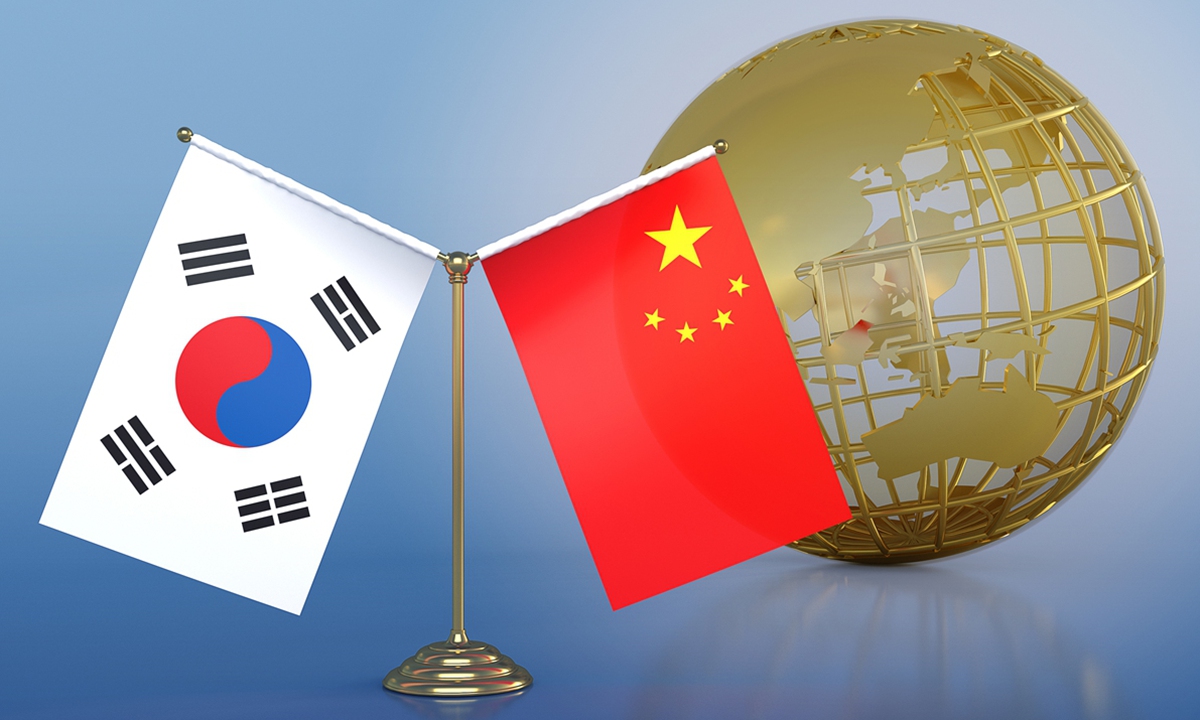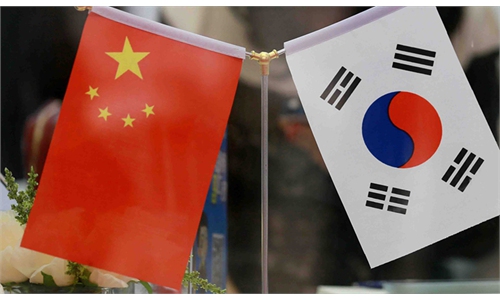South Korea naturally wins respect when it adheres to independent diplomacy: Global Times editorial

China South Korea Photo:VCG
South Korean Foreign Minister Park Jin landed in Qingdao, Shandong Province, on Monday afternoon, kick-starting his first visit to China since taking office. This is also the first high-level South Korean delegation to visit China since the new administration of President Yoon Suk-yeol assumed office. Both China and South Korea attach great importance to the visit, and there are many topics worthy of in-depth communication between the two sides. In addition, the visit comes right after US House Speaker Nancy Pelosi's visit to Taiwan island, which has caused a serious impact on the situation in East Asia and attracted great attention as well as complicated interpretations from the international society.
Many people have noticed that during Pelosi's visit to South Korea after the Taiwan island visit, Yoon and Park did not meet her. South Korean officials also deliberately avoided discussing the Taiwan question with Pelosi. In terms of such arrangement, South Korea has considerations for its special geographical position, which cannot be viewed in a simplistic way. Still, the Chinese society generally regards it as a demonstration of South Korea's independent diplomacy and rationality toward China, especially in sharp contrast with Japan. As a result, South Korea has won recognition and respect from Chinese society. To a certain extent, this has created a constructive and positive atmosphere for Park's China visit.
But obviously, some countries do not want to see China-South Korea relations maintain a healthy and stable momentum of development. When China and South Korea make efforts to meet each other halfway, cold water is often poured toward them, mixed with sinister questioning and provocation. This time too. Major media outlets in the US and the West, including South Korea's conservative public opinion, are accustomed to highlighting and amplifying the negative aspect of China-South Korea relations, creating differences, contradictions and even confrontations.
Some realities are indeed worrying. The voices advocating mutual benefit and friendly cooperation between China and South Korea have been weakened, while the radical attitude full of emotional shortsightedness has been strengthened. If China-South Korea ties are to move forward, the practical resistance they face is increasing. China and South Korea must step over the pits dug by those people and break through the barriers they set up.
We noticed that the Yoon administration has always intentionally made efforts to avoid being kidnapped by populism in the three months since taking office. While strengthening its alliance with the US and de-escalating tensions with Japan, it has also paid relatively much attention to its relations with China, maintaining a generally stable trend in China-South Korea relations. It is important to emphasize that such a dynamic relationship should be further consolidated and carried on, which is in the interest of both China and South Korea.
The issue of THAAD deployment is a major hidden danger that cannot be avoided in China-South Korea ties. We are not against South Korea taking necessary measures to maintain its own security, but they cannot be based on compromising the security interests of China, South Korea's friendly neighbor. THAAD is a wedge Washington is trying to drive into Northeast Asia, to disturb the region so it can profit from the conflicts. We hope Seoul will not interpret its due respect toward Beijing's strategic interests as "yielding to China." On the contrary, it should see that it is precisely "yielding to US interests" by deploying THAAD under Washington's pressure. China has never told South Korea how to make "friends," but South Korea should never accept a knife handed by its "friends."
In addition, another urgent issue for South Korea is that the US will hold a working-level meeting of the so-called Chip 4, an envisioned alliance of chip-making powerhouses - the US, Japan, South Korea, and China's Taiwan - at the end of August. Recently, South Korean media have been debating whether the country should participate in the meeting and how it should be done. According to the latest reports from South Korean media, South Korean government recently expressed intent to join preliminary "Chip 4" meeting, and to reason with the other participants to "respect the one-China policy and avoid mentioning about any export barriers to China." In short, they should not "provoke China." If South Korea has to join small cliques pieced together by the US, the global community will expect to see South Korea truly play a balancing and corrective role. This also manifests Seoul's unique value.
South Korea is an important regional country in a sensitive and special geopolitical location. As mentioned earlier, the country's interests and policy orientation are distinctly different from those of the US and Japan on the Taiwan question, the semiconductor supply chain, and the various US moves that contain China in the Asia-Pacific region. There is enough room for China-South Korea cooperation, as long as Seoul insists on considering issues from the perspective of reality and its long-term interests. It is believed that Park's ongoing trip to China will become an opportunity to promote further development of China-South Korea relations.

